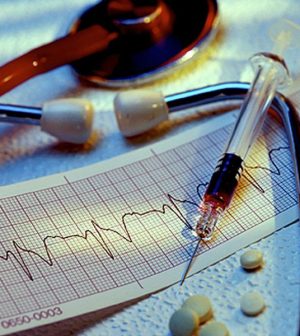- 10 Strategies to Overcome Insomnia
- Could Artificial Sweeteners Be Aging the Brain Faster?
- Techniques for Soothing Your Nervous System
- Does the Water in Your House Smell Funny? Here’s Why
- Can a Daily Dose of Apple Cider Vinegar Actually Aid Weight Loss?
- 6 Health Beverages That Can Actually Spike Your Blood Sugar
- Treatment Options for Social Anxiety Disorder
- Understanding the Connection Between Anxiety and Depression
- How Daily Prunes Can Influence Cholesterol and Inflammation
- When to Take B12 for Better Absorption and Energy
More Evidence That COVID Infection Brings Long-Term Heart Risks

New research supports the notion that COVID-19 can cause long-term heart problems.
The analysis of U.S. health data found COVID patients are at increased risk of heart complications for at least a year after infection.
Those complications include heart rhythm problems, inflammation, blood clots, stroke, coronary artery disease, heart attack, heart failure and death, according to findings published Feb. 7 in the journal Nature Medicine.
“For people who were clearly at risk for a heart condition before becoming infected with SARS-CoV-2, the findings suggest that COVID-19 may amplify the risk,” said senior author Dr. Ziyad Al-Aly, an assistant professor of medicine at Washington University in St. Louis. “But most remarkably, people who have never had any heart problems and were considered low-risk are also developing heart problems after COVID-19.”
That includes young and old, men and women, people of all races, people with obesity and those without. It includes people with and without diabetes, those with a history of heart disease and those with none. It also includes people with mild COVID infections as well as those who were hospitalized with severe disease, Al-Aly said.
For the study, his team analyzed U.S. Department of Veterans Affairs health system data on nearly 154,000 patients who tested positive for COVID between March 1, 2020 and Jan. 15, 2021, and survived the first 30 days of the disease.
Very few were immunized because COVID vaccines were not yet widely available when the data were collected.
Those patients were compared with more than 5.6 million patients who did not have COVID during the period and with more than 5.8 million patients seen by the VA health system before the pandemic (March 2018 through January 2019).
The researchers found that in the year after they were infected, COVID patients had a 4% higher rate of heart disease — including heart failure and death — than those who did not have COVID.
“Some people may think 4% is a small number, but it’s not, given the magnitude of the pandemic,” Al-Aly said in a university news release. He is also chief of the Research and Education Service at the Veterans Affairs St. Louis Health Care System.
That translates to roughly 3 million Americans who have heart complications due to COVID.
Compared to the control groups, COVID-19 patients had a 72% higher risk of coronary artery disease; 63% higher risk of heart attack, and 52% higher risk of stroke. Overall, these patients had a 55% higher risk of a major adverse cardiovascular event that includes heart attack, stroke and death.
More than 380 million people worldwide have had COVID-19 since the start of the pandemic.
“Consequently, COVID-19 infections have, thus far, contributed to 15 million new cases of heart disease worldwide,” Al-Aly said. “This is quite significant. For anyone who has had an infection, it is essential that heart health be an integral part of post-acute COVID care.”
Besides heart issues, COVID can also lead to other complications known collectively as long COVID.
Al-Aly said the findings highlight the importance of getting vaccinated against COVID as a way to prevent heart damage.
More information
The American Heart Association has more on COVID-19.
SOURCE: Washington University in St. Louis, news release, Feb. 7, 2022
Source: HealthDay
Copyright © 2026 HealthDay. All rights reserved.










